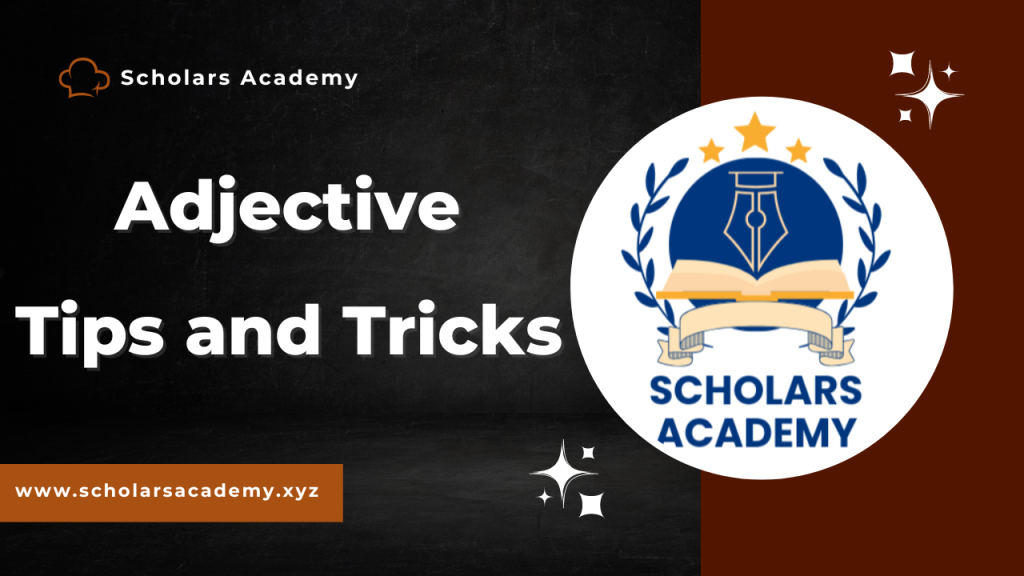Adjectives are the words or group of words that show the quality of noun/pronoun or provide some additional information about them.
In other words, Adjectives describe a noun or pronoun.
Lets Discusses Adjective Tips & Tricks
Let’s see some examples.
Bilawal is brave.
To be “Brave” is the quality of Bilawal. Since Bilawal is a noun, hence Brave is an adjective.
I have some/much water.
Here, we have used “some/much” with water. It gives an idea of about the amount of water. So using “some/much” gives some additional information about water.”Water is a noun so “some/much” is an adjective.
This is a black shirt.
Here, we have used black shirt as it provides some additional information about shirt, It is a shirt but of black colour. So black is an adjective.
This is a shirt of black colour.
(Adjective Phrase)
What is the Adjective Phrase?
Adjective Phrase: has no Subj+Verb
It usses preposition+adjective+noun and provide some additional information.
This is a shirt, which is of black colour.
(Adjective Clause)
What is the Adjective Clause?
Combination of Subject+Verb is called Adjective Clause (AC).You can see “Which is” in the sentence gives additional information.”Which” replaces the word “Shirt” that is Subject and “Is” Verb, hence we call it Adjective Clause.
He is a wealthy man.
Here, “Wealthy” is an adjective and “Man” is a noun. It gives some additional information about man so “man” is a noun.
He is a man of great wealth.
(Adjective Phrase)
(Of great wealth)Prep+Adj+Noun=Group of words without using subject+ verb like who is, has etc.
Group of words or combination of words in which there is no Subject+Verb is used, just only preposition after adjective+noun with it, then we can call it Adjective Clause (AC).
He is a man, who has great wealth. (Adjective Clause)
“Who has great wealth” is adjective clause as it gives additional information about noun or pronoun.
“Who” replaces man and “Has” is a verb (Sub+Verb) but the meaning of all sentences related to wealthy man is same but in different ways to understand.
She is a friendless girl.
Here, “Friendless” is an adjective and “Girl” is a noun as it gives some additional information about girl.
She is a girl without a friend.
(Adjective Phrase)”Without a friend” meaning is same as above sentence but it is used with different way as it is written “Without a friend””Friendless” is just a word only but If I say “without a friend” I have added many words to make adjective replacing “Friendless” word by using preposition+adjective+noun and make it an adjective phrase.
She is a girl who has no friends.
(Adjective Clause)”
Who” replaces girl that is subject and “Has” is a verb.Bilawal is my brother, who plays with you.In this sentence, when said “Who plays with you”, It provides some additional information about Bilawal that he plays with you. Since Bilawal is the name of a person, means a noun, hence the clause “who plays with you” which provides additional information about a noun is an adjective clause.
The tall boy in the red shirt is Bilawal.
Here “tall” is an adjective and “boy” is a common noun. Now (in the red shirt) It is an adjective phrase as it is written with preposition+adjective+noun.
Adjective Phrase defines the group of words without subject and verb in the middle of the sentence. If I write “This is the tall boy who has red shirt” It is a Adjective Clause as it is defined with subject+ verb by using “who has”, hence “who” replaces this tall boy and “has” is a verb.
He has a beautiful watch.
Here “Beautiful” is an adjective as it gives additional information about watch. Watch is a noun.
He has a watch of great look.
Here, “of great look” is a Adjective Phrase as it is defined with group of words by using preposition+adjective+noun.
Adjective Phrase has no subject and verb.
He has a watch, which is very beautiful.Here, “which” is subject and “Is” in the sentence is verb and “very” is an adverb.”Which” tells about watch as a subject in the sentence and “Is” as a verb.
Morally, all the sentences have the same meaning.
Adjective Tips & Tricks
Adjective Tips & Tricks

